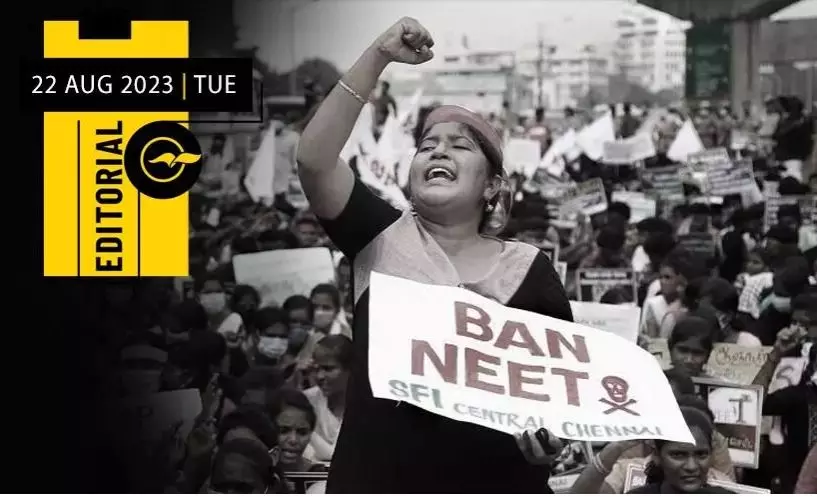
Challenges Raised by Tamil Nadu Regarding NEET
text_fieldsThe protest opposing the NEET (National Eligibility cum Entrance Test), which serves as the entrance examination for medical courses, and demanding dispensing with it as eligibility for medical studies, has now garnered participation from all Tamil Nadu ministers after being triggered by the state government. Several ministers, including Udayanidhi Stalin, who is the son of Chief Minister MK Stalin and also serves as the secretary of the DMK youth wing, were actively engaged in protests held across various locations on Sunday, expressing strong dissent towards NEET. The protest also encompassed severe criticism aimed at the BJP-nominated state Governor, RN Ravi, who staunchly champions NEET and has delayed the passage of a bill endorsed by the State assembly, aimed at countering the NEET, for an extended duration.
The inception of NEET in its current form took place as a result of a 2016 Supreme Court ruling, creating the National Eligibility Test for MBBS, BDS and allied courses. Prior to that, as early as in 2009, the Medical Council of India had advocated a unified national eligibility entrance test for these courses. The goal was to eliminate the complexities of students having to take separate exams in different states, prompting a call for a standardized entrance test at national level. However, in 2013, a three-judge panel of the Supreme Court declared a common entrance test unconstitutional, asserting that the Medical Council of India had no authority to impose such a requirement. The decision was eventually overturned by a 2:1 majority. Nonetheless, three years later, in 2016, a five-judge bench of the Supreme Court suspended the previous verdict and granted constitutional validity to NEET. Still, conceding specific requests of certain states, the Central government granted them a one-year exemption. Then, in 2017, the Supreme Court denied any more exemption, thus making NEET obligatory throughout the country. The court also stipulated that, in addition to the requirement of uniform criteria for entrance, and merit being the sole basis for selection, the court emphasized the prohibition of allowing minimally qualified students to secure admission on the strength of money. As a result, NEET became obligatory even in self-financed colleges.
The opposition to NEET was not confined to Tamil Nadu alone; states such as Gujarat, Telangana, and Andhra Pradesh also had opposed it on different grounds. The robust resistance from the Tamil Nadu government has both constitutional and societal dimensions. Those preparing for NEET often require coaching centre preparation, a burden that is particularly challenging for economically disadvantaged students, as they pointed out. When admission hinges solely on entrance exam scores, the knowledge and skills acquired by students till higher secondary could potentially go waste. Despite the opposition, the legal basis for the Central government's persistence with the test is rooted in Education as a subject being part of the Concurrent List of the Constitution. In simpler terms, in cases of disagreement between a state and the Central government, Union laws would pevail. But Tamil Nadu contends that this encroaches upon states' rights. Evidently, this stance presents a visible and direct challenge to the BJP government's "one country, one law, one examination"-model slogan.
An argument also exists suggesting that NEET contravenes Article 14, which guarantees equal rights for all. When comparing the 99 per cent of students who secure eligibility through coaching centre training to those who cannot afford it, an unequal competition of opportunities arises between the financially challenged and the affluent. Additionally, a majority of those who crack NEET are individuals who attempt the exam multiple times after initial failures, reflecting its importance for economically disadvantaged individuals. Furthermore, criticisms by the Tamil Nadu government, apart from its being prohibitively expensive, was also with the charge that entrance tests were being seen as the be-all and end-all of education. In 2021, a bill opposing NEET was passed in the assembly with support from all parties except the BJP. However, Governor R N Ravi delayed the bill for long before returning it. In 2022, the same bill was passed by the Assembly for a second time and submitted to the governor for approval. Yet again, it was held without any action being taken. During this time, the Tamil Nadu government moved a writ in the Supreme Court, seeking exemption from NEET. Since the bill was put up for approval of the President, the government asked the Supreme Court to defer their plea for six months. With the bill under the President's consideration, the Tamil Nadu government is conducting protests to exert pressure on the Central government. The future raises numerous questions: What decision will the President make regarding the bill? Will she decide by herself or consult with the Centre? If the President approves the bill, and a legal challenge arises, how will the Supreme Court, which has previously supported NEET, respond? In the event of an unfavourable verdict, how will the Tamil Nadu government handle the outcome? These questions have far-reaching implications for the future relationship between the Central government and the state. And ipso facto the question is critical.























